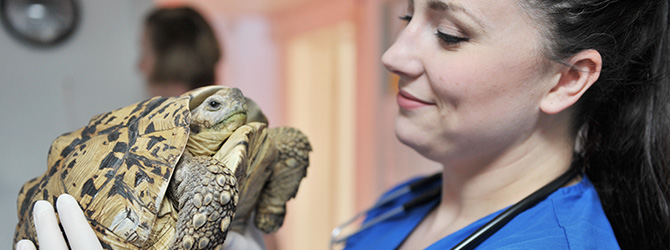Tortoise health problems: what to do with a sick tortoise
Tortoises make great pets. A balanced, correctly portioned diet, a good source of ultraviolet light and appropriate levels of heat will keep most tortoises healthy, but, like all animals, they can become ill – and it pays to be aware of the possible health complications so you know what to look out for.
We look at the most common tortoise illnesses, and how to care for a sick tortoise. If you suspect your tortoise is suffering from any of the conditions below, make an appointment with your specialist reptile vet.
Stomatitis in tortoises
Stomatitis, commonly known as mouth rot, is a common condition caused when bacteria in the mouth gets into an open wound and causes infection in the lining of the gums and mouth.
Symptoms include loss of appetite, swelling or colour change in your tortoise’s mouth and gums, and a white, cheesy-looking discharge around the mouth.
If you think your tortoise has mouth rot, consult your specialist reptile vet for advice, and be sure to keep your pet’s water supply clean in the meantime.
Infectious diseases in tortoises
There are few infectious diseases in tortoises, such as chelonian herpesvirus and mycoplasma, these often cause runny noses (used to be called Runny Nose Syndrome-RNS). Prevention can be achieved by quarantine isolation of new tortoises and ideally not keeping different species together, especially mixing tropical species, (such as leopard tortoises) with Mediterranean species (such as Hermans).
If you have any concerns about these type of infectious diseases, please speak to your exotic vet specialist.
Tortoise parasites
Like many other animals, tortoises are susceptible to parasitic infections. You may spot the signs of worms in your tortoise’s poo, but they can be difficult to spot. More often, tortoise parasites are diagnosed by a specialist reptile vet (who may need a sample of your tortoise’s poo!)
Symptoms of tortoise parasites include loss of appetite, diarrhoea or general signs of being unwell. If you spot any of these symptoms – or you have any concerns about a sick tortoise – speak to a specialist reptile vet.
Stomach problems in tortoises
Tortoises can suffer from diarrhoea and constipation just like any other creature. These are often, but not always, signs of a poor quality diet.
If your tortoise stops going to the toilet, they are likely to be constipated, you should speak to your specialist reptile vet.
If your tortoise has diarrhoea, make sure you’re feeding the right diet for the species you have. Bathe them in warm water daily to prevent dehydration, but take them to a vet without delay.
Skin and shell problems in tortoises
Tortoises are prone to a number of conditions that affect their skin and shell, particularly abscesses, which are a common cause of swelling.
Shell rot is a common condition that’s usually caused by ticks or injuries. Tortoise shell rot can be bacterial or fungal, and treatment can include sedation and removal of affected tissue and cleaning the shell, and antibiotic injections. Speak to your specialist reptile vet if you spot any signs of skin or shell conditions in your tortoise.
Signs your tortoise needs veterinary care
Contact your specialist reptile vet if your tortoise displays any of the signs or symptoms below:
- Respiratory problems
- Vomiting or weight loss
- Drooping head or limbs
- Gaping mouth
- Not eating after hibernation
- Lethargy and weakness
- Lumps or swelling
- Runny eyes or nose
Want more information on tortoise illnesses?
For expert advice on tortoise health problems, speak to a specialist reptile vet.
Find your nearest vet using our Find a Vet page, or speak to a vet online using Online Vets.

